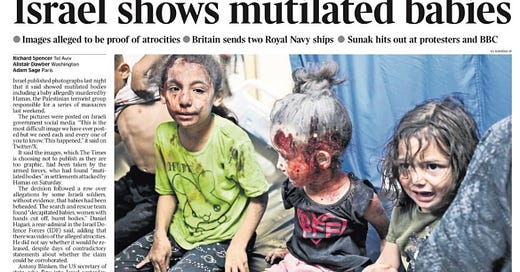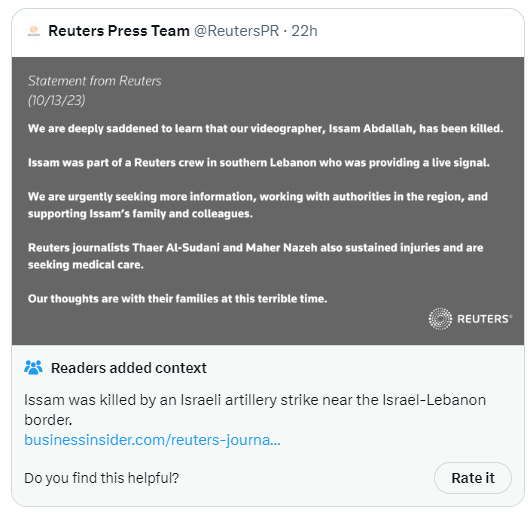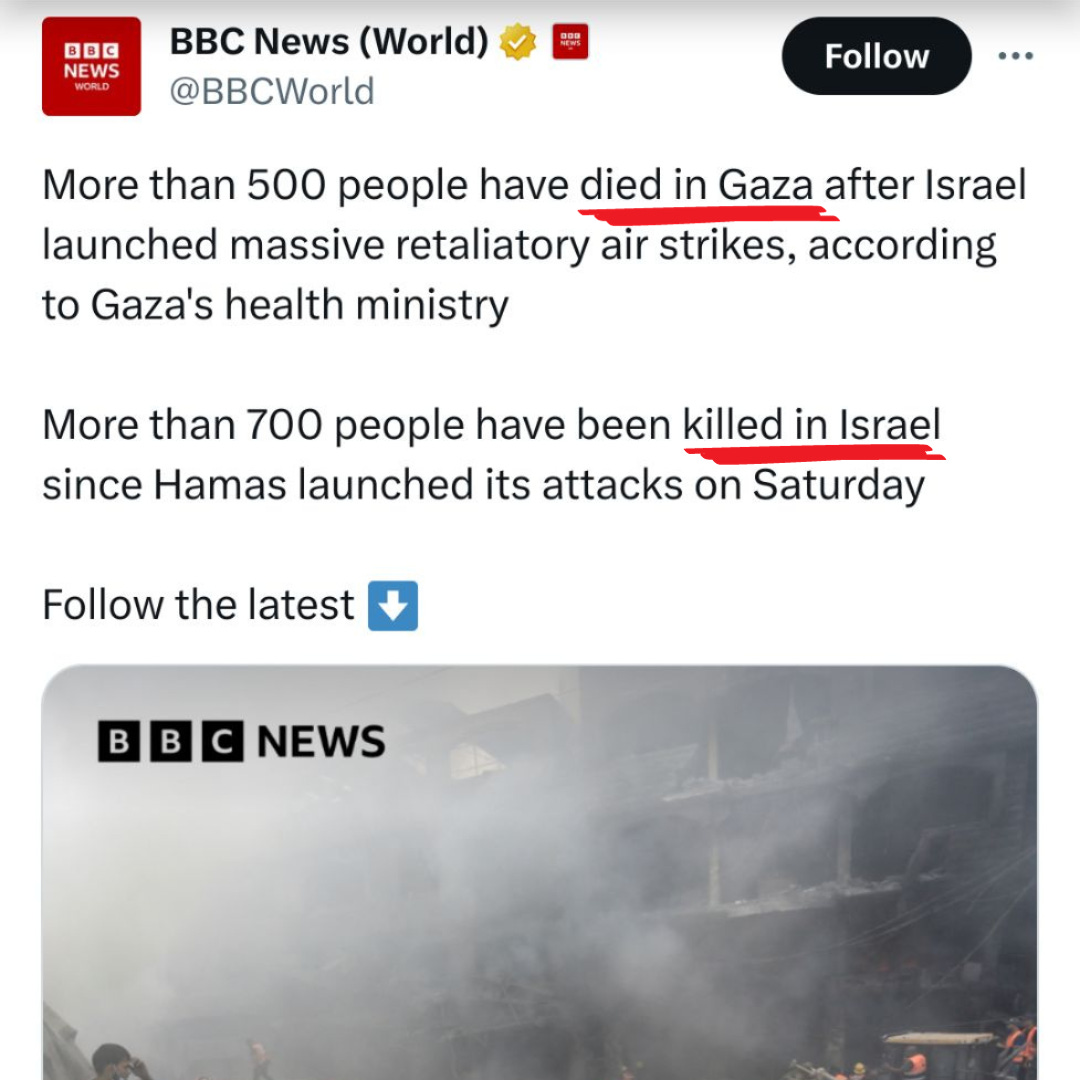Propaganda is the Executive Arm of the Invisible Government
Some examples in the media over the past week
Propaganda is probably as old as war itself. From the moment humans began to engage in conflicts over resources, territories, or ideologies, the manipulation of information and public opinion became critical tools in the arsenal of warfare. Long before the term "propaganda" was coined, ancient civilisations employed various methods to influence both their own people and their enemies. Whether it was Egyptian pharaohs inscribing exaggerated accounts of their military victories on monuments, or the Greeks using theatre and oratory to drum up support for campaigns, the underlying principle has always been the same: control the narrative to achieve strategic goals.
Even the legendary Trojan Horse can be seen as an early form of tactical deception, a physical manifestation of manipulating beliefs to gain an advantage. In essence, propaganda in warfare has evolved hand in hand with advances in communication methods, from oral storytelling to the internet, but its core objectives—shaping perception, fostering allegiance, and facilitating control—have remained constant throughout human history.
"Propaganda is the executive arm of the invisible government." - Edward Bernays, "Propaganda"
"All warfare is based on deception." - Sun Tzu, "The Art of War
"Propaganda is to a democracy what the bludgeon is to a totalitarian state." - Noam Chomsky, "Media Control: The Spectacular Achievements of Propaganda"
"The first casualty when war comes is truth." - Hiram Johnson, U.S. Senator
"During times of universal deceit, telling the truth becomes a revolutionary act." - George Orwell
"The propagandist's purpose is to make one set of people forget that certain other sets of people are human." - Aldous Huxley, "The Olive Tree"
"Propaganda does not deceive people; it merely helps them to deceive themselves." - Eric Hoffer
"The most effective way to destroy people is to deny and obliterate their own understanding of their history." - George Orwell
"To abandon facts is to abandon freedom. If nothing is true, then no one can criticize power because there is no basis upon which to do so." - Timothy Snyder, "On Tyranny: Twenty Lessons from the Twentieth Century"
"The essence of propaganda consists in winning people over to an idea so sincerely, so vitally, that in the end they succumb to it utterly and can never escape from it." - Joseph Goebbels, Reich Minister of Propaganda in Nazi Germany
You are constantly reading propaganda. If you read something in the MSM that causes an emotive outburst, especially when connected with war, it is likely to be propaganda. When that emotional trigger has been pressed, be aware of it, take a deep breath, realise what emotions have been provoked, think critically, evaluate the context of the piece and then re-read using some of the following steps:
Check the credibility of the author. Are they known for balanced reporting or do they have a particular bias. Look at their previous work and whether they have a specific agenda;
Analyse the content for strong emotional triggers and logical fallacies. Do the arguments make sense or have ad hominem attacks? Are the images or videos designed to provoke specific reactions or convey particular messages?
Be conscious of your own bias. We all have our own biases that can affect how we interpret information so try to separate your own opinions from the information presented.
Propaganda can be used for many reasons, each contributing to the overall objectives of the conflict. These include:
Psychological Advantage:
Boosting Morale: One of the primary purposes is to uplift the spirits of the people and the troops. A motivated army and supportive public can be significant assets;
Induce Fear: Propaganda can also work to demoralise the enemy, making them less effective in their war efforts.
Strategic Goals:
Misinformation: Propaganda can be used to mislead the enemy about intentions, capabilities, and movements, making it a tool for strategic deception;
Unity: During a war, it's essential for a nation to stand together. Propaganda aims to eliminate internal dissent and create a unified front.
Political Objectives:
Legitimise Actions: Governments often use propaganda to legitimise their actions or to delegitimise the enemy’s actions;
Gain Support: A nation will use propaganda to gather support from allies or neutrals, painting themselves as the ‘good guys’ in the conflict.
Social Dynamics:
Dehumanise the Enemy: Propaganda often portrays the enemy as less than human to make it psychologically easier for soldiers to fight against them;
Cultural or Ideological Reinforcement: By invoking shared symbols, values, and myths, propaganda can strengthen the cultural or ideological bonds that hold a community together.
Resource Allocation:
Funding and Resources: Support for the war effort isn't just moral or psychological. Propaganda can also help in the mobilisation of resources, encouraging people to invest in war bonds or contribute to the war effort in other ways.
Control of Narrative:
Counteract Enemy Propaganda: If an enemy is using propaganda effectively, a counter-propaganda campaign may be initiated to neutralise its effects.
With the rise of the internet and citizen journalism, governments have needed to increase the use of propaganda to try to keep control of the narrative. More and more people ‘waking up’ means more and more propaganda. The use of propaganda reached its pinnacle during the pandemic and has not dissipated during the Ukrainian war and now the conflict in Israel.
A good example of controlling the narrative over the past week can be seen in this Time front page.
The title of “Israel shows mutilated babies” is accompanied by a picture of Palestinian children wounded by Israeli airstrikes in Gaza. But if you don’t read the small print and only glance at the headline, a strong one sided emotional response is provoked.
Another example of trying to control the narrative is this statement from Reuters.
Even Twitter stepped into to add context to this shameful piece of propaganda. One of Reuters own journalists was killed by an Israeli airstrike but they would not admit that fact to their readers. Even today, the article on their website says “Reuters journalist killed in Lebanon in missile fired from direction of Israel”. By not directly saying that an Israeli missile killed their journalist, they leave room for minds to come up with other conclusions or not even think about it.
It can even be as subtle as the choice of words used.
Of course there are massive amounts of propaganda on both sides and I have chosen relatively ‘light’ examples because some of it is too horrendous to publish.
Whilst war is complicated, the essence of human compassion is simple. Any life taken is a tragedy and should never be celebrated or used as part of an agenda. An Israeli baby dying is as horrific as a Palestinian baby dying. The families and parents of both babies will feel as much pain as each other.
If you celebrated the attacks in Israel, you are a psychopath. If you called for Gaza to be wiped out and celebrated Israeli airstrikes on civilians, you are a psychopath. It really is that simple.
Keep on guard and realise that the media is constantly trying to manipulate you. I’m quite confidant that most of my readers do this already, especially after the last few years. However, it has been disappointing to see so many people who championed free speech and liberty during the pandemic, now showing their true colours.







I avoid msm for any information. The Israel/Gaza debacle can only be explained by doing a very deep dive. And msm is NOT the place to dive.
This post will be definitely getting reposted. This message is what people need to hear because we live in a world CREATED BY PROPAGANDA!
I once heard “if you think the news is fake, wait till you find out about history.”
That’s what I write about on my stack. How to navigate this deception and illusion that infiltrates ALL aspects of our lives.